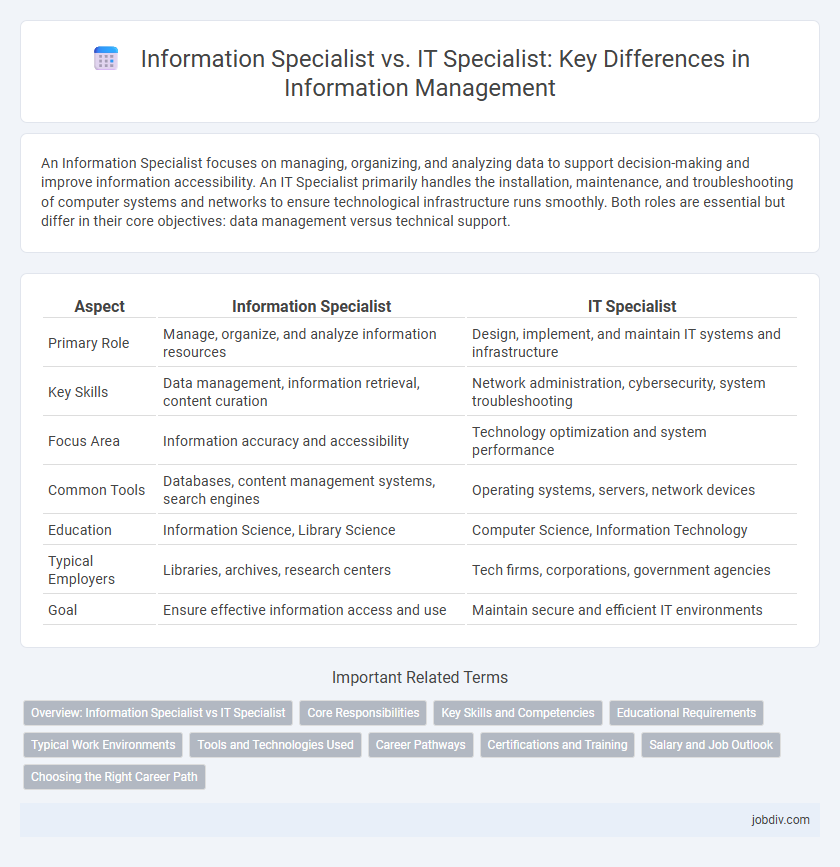An Information Specialist focuses on managing, organizing, and analyzing data to support decision-making and improve information accessibility. An IT Specialist primarily handles the installation, maintenance, and troubleshooting of computer systems and networks to ensure technological infrastructure runs smoothly. Both roles are essential but differ in their core objectives: data management versus technical support.
Table of Comparison
| Aspect | Information Specialist | IT Specialist |
|---|---|---|
| Primary Role | Manage, organize, and analyze information resources | Design, implement, and maintain IT systems and infrastructure |
| Key Skills | Data management, information retrieval, content curation | Network administration, cybersecurity, system troubleshooting |
| Focus Area | Information accuracy and accessibility | Technology optimization and system performance |
| Common Tools | Databases, content management systems, search engines | Operating systems, servers, network devices |
| Education | Information Science, Library Science | Computer Science, Information Technology |
| Typical Employers | Libraries, archives, research centers | Tech firms, corporations, government agencies |
| Goal | Ensure effective information access and use | Maintain secure and efficient IT environments |
Overview: Information Specialist vs IT Specialist
Information Specialists focus on managing, organizing, and analyzing data to enhance knowledge accessibility across organizations, emphasizing data curation and content management systems. IT Specialists concentrate on designing, maintaining, and troubleshooting computer systems, networks, and software infrastructure to ensure optimal technology performance. Both roles require technical expertise, but Information Specialists prioritize information workflow and data governance, while IT Specialists specialize in hardware, software, and network functionality.
Core Responsibilities
Information Specialists manage data organization, metadata standards, and information retrieval systems to ensure accurate and accessible knowledge resources. IT Specialists focus on designing, implementing, and maintaining computer systems, networks, and cybersecurity measures to support organizational technology infrastructure. Both roles require strong problem-solving skills, but Information Specialists emphasize data curation and user access, while IT Specialists prioritize technical system performance and security.
Key Skills and Competencies
Information Specialists excel in data management, content curation, and information retrieval systems, emphasizing expertise in metadata, digital archiving, and information governance. IT Specialists focus on technical skills such as network administration, cybersecurity, software development, and hardware maintenance, highlighting proficiency in coding languages, system troubleshooting, and infrastructure support. Both roles require strong analytical abilities and problem-solving skills but differ significantly in their primary knowledge domains and technical competencies.
Educational Requirements
Information Specialists typically require a bachelor's degree in information science, library science, or a related field, emphasizing courses in information organization, management, and retrieval. IT Specialists generally hold degrees in computer science, information technology, or cybersecurity, with a focus on programming, network infrastructure, and system administration. Certifications such as Certified Information Professional (CIP) for Information Specialists or CompTIA A+, Cisco CCNA for IT Specialists further enhance qualifications and job prospects.
Typical Work Environments
Information Specialists commonly operate in libraries, archives, and corporate data centers where managing and organizing digital records is essential. IT Specialists typically work in technology companies, government agencies, or IT departments, focusing on system maintenance, cybersecurity, and network management. Both roles require collaboration in office settings, but Information Specialists emphasize data curation while IT Specialists prioritize technical infrastructure support.
Tools and Technologies Used
Information Specialists primarily use data management systems, content management tools, and knowledge-sharing platforms like SharePoint and Confluence for organizing and distributing information. IT Specialists focus on network infrastructure, cybersecurity tools, and system administration software such as Cisco routers, firewalls, and virtualization platforms like VMware. Both roles integrate collaboration software like Microsoft Teams but differ significantly in their core technological environments and toolsets.
Career Pathways
Information Specialists focus on managing, analyzing, and organizing data to support decision-making in various industries, often progressing into roles such as Data Analyst, Records Manager, or Information Governance Officer. IT Specialists specialize in maintaining and troubleshooting hardware, software, and networks, with career advancements leading to positions like Network Administrator, Systems Engineer, or IT Manager. Both career pathways demand strong technical skills, but Information Specialists prioritize data curation and insight extraction, whereas IT Specialists emphasize infrastructure and technical support.
Certifications and Training
Information Specialists often pursue certifications such as Certified Information Professional (CIP) and Records Management certifications, emphasizing data governance, information lifecycle management, and compliance training. IT Specialists typically hold certifications like CompTIA A+, Cisco Certified Network Associate (CCNA), and Microsoft Certified Solutions Expert (MCSE), focusing on hardware, networking, and system administration skills. The training for Information Specialists leans towards information strategy and user support, while IT Specialists focus on technical troubleshooting and infrastructure management.
Salary and Job Outlook
Information specialists typically earn a median salary of around $63,000 annually, while IT specialists command higher wages averaging about $90,000 per year due to their technical expertise. The job outlook for IT specialists is robust, projected to grow 15% from 2022 to 2032, driven by increasing demand for cybersecurity and network management. Information specialists face slower growth, estimated at 5%, reflecting steady but less dynamic demand in data management and archival roles.
Choosing the Right Career Path
Information Specialists focus on managing, organizing, and analyzing data to support business decisions, while IT Specialists concentrate on maintaining and troubleshooting computer systems and networks. Choosing the right career path depends on whether you prefer working directly with data and information workflows or handling technical infrastructure and software systems. Understanding your strengths in data management versus technical support is essential for aligning your skills with the appropriate specialization.
Information Specialist vs IT Specialist Infographic

 jobdiv.com
jobdiv.com